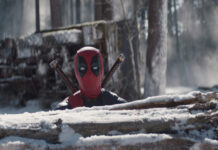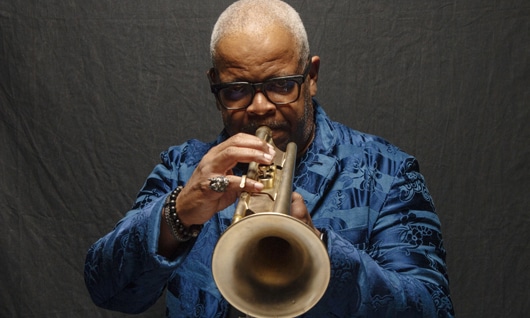
*Terence Blanchard has carved out a winding and exciting musical career for himself since debuting in 1982 as a member of the bands of two legends: vibraphonist Lionel Hampton and drummer Art Blakey’s Jazz Messengers. Classically trained and with jazz in his heart, Blanchard has recorded as a soloist, as the leader of several groups, scored over 40 films (most frequently with director Spike Lee), and composed two operas, the most recent, “Fire Shut Up In My Bones,” being the first opera by an African American composer in the Metropolitan Opera of New York’s history. For Blanchard, no endeavor is frivolous. He makes them all count, including teaching at four institutions of higher learning.
Currently juggling scoring a film for an overseas project, wrapping a summer tour with Herbie Hancock, and revised presentations of “Fire…” in San Francisco, Blanchard will be bringing his current ensemble, The E-Collective, to Los Angeles’ intimate outdoor showcase The John Anson Ford Theater on Tuesday, August 9th to astound audiences with music from his latest Blue Note Records album, Absence.
This powerful project finds Blanchard, keyboardist Fabian Almazan, guitarist Charles Altura, bassist David Ginyard and drummer Oscar Seaton collaborating with the equally progressive and unpredictable Turtle Island String Quartet on compositions of and inspired by living legend, Wayne Shorter.
In the conversation that follows, Blanchard discusses his ongoing relationship with Shorter, the challenges intrinsic to approaching his music and what life for touring musicians post-COVID has been like as he gets back on the performing trail.
OTHER NEWS ON EURWEB: Driver Arrested in Deadly LA Crash – Six Killed Including Pregnant Woman and Toddler | WATCH-it-Happen
Galloway: What continues to motivate you to be doing so many projects – one on top of the other – all at the same time?
Blanchard: The IRS (big laugh) No… I don’t look at myself as a saint. I just love music. The sky’s the limit. I was just on tour with Herbie Hancock all summer in Europe. Watching him at 82 still kickin’ everybody’s ass on the bandstand – still searching and being creative – is an example of what I’m talking about. He loves music and playing for people. That’s what motivates me. Everything becomes a challenge and an adventure.
Galloway: Have you gotten to a point where you have to turn stuff down?
Blanchard: It’s starting to happen like that. There are some things I’d like to do that I just can’t do. But look…that’s a good problem to have.
Galloway: Do you feel people are more appreciative of experiencing live art now than before the pandemic lockdowns?
Blanchard: Like everything else in the world, live music was in a state of limbo with everybody trying to play catch up. It’s just a bizarre time. That was the cool thing about being on tour in Europe because every place we went, while it was scary to be in close proximity to people again, it was also exciting because the people really wanted to come out and see love music again. I would say that world public social interaction and live music are so much more appreciated now. After lockdown and dealing with that virus, people seem to be a lot more conscious of their own mortality. The number of people coming up to us after shows telling us, “Thank you,” with such intense sincerity spoke volumes. The sad part is that, as musicians, we lived in a bubble. We didn’t really get to have the after-show socialization that we used to. The musicians were concerned about keeping Herbie safe and Herbie was concerned about keeping us all safe. We were on a tour bus so if any one of us went down, that ends the whole tour.
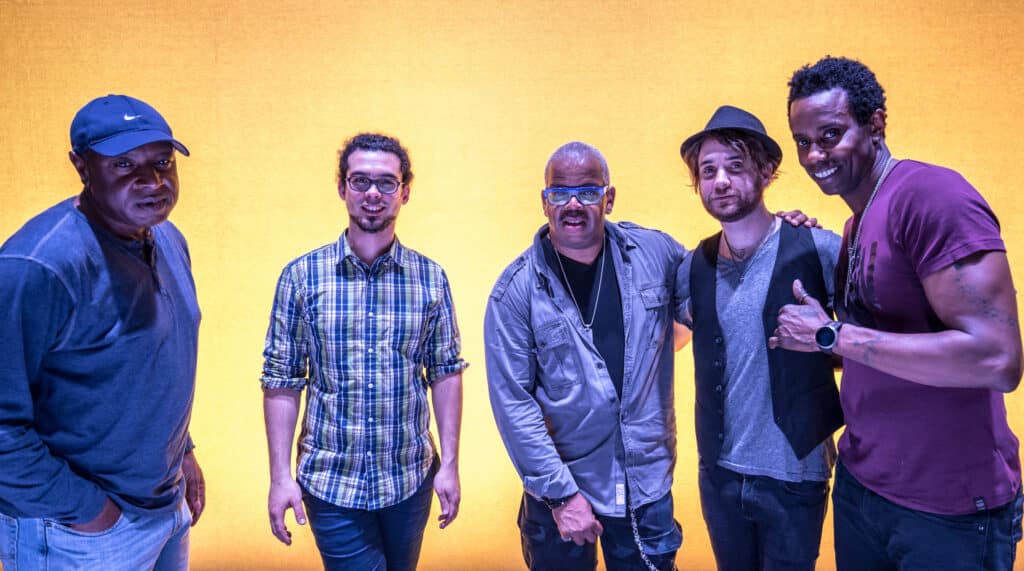
Galloway: What was it about Wayne’s music that made you want to dive in?
Blanchard: Well, first of all obviously, it’s beautiful music…but beautiful in a way that’s different. He’s like the next great composer to me. He knows how to take a simple melody yet harmonize it in such a way that it feels fresh-made. He’s not doing anything where he’s writing dense harmonies…he’s just smart. Art Blakey used to tell us, “The easiest thing to do is to write some shit that nobody can understand. Figure out how to connect to people yet still have those variations in it where the music becomes your own.” That’s what Wayne does. He’s actually trying to touch you…to have an impact on your soul. And he does that by catching your attention with familiar melodies that just feel so different. A lot of that has to do with the way he structures the melodies and the way he uses harmony. God bless him. He is a true treasure.
Galloway: Do you view Wayne as one who came out of the gate near-fully formed or are you able to chart an arc of growth?
Blanchard: Both. When I’m teaching composition at school, I use Wayne as an example. I say, “Let’s go back to some of his earlier records,” and we can clearly see he was developing his ideas then. A lot of times with young composers, they’ll state something then, all of a sudden, they want to try to be so hip. But you won’t even recognize the melody afterwards. That goes away from the whole idea of what you want to convey. It’s not about trying to trick the audience or prove to them that you’re doing something so complex. It’s exactly the opposite. It’s about grabbing them by the hand and taking them on a journey. So how do you do that in your way? Wayne is a master at that. Another thing Art used to tell us is, “You never want to be too hip…`cuz two hips make an ass!” (big laughter)
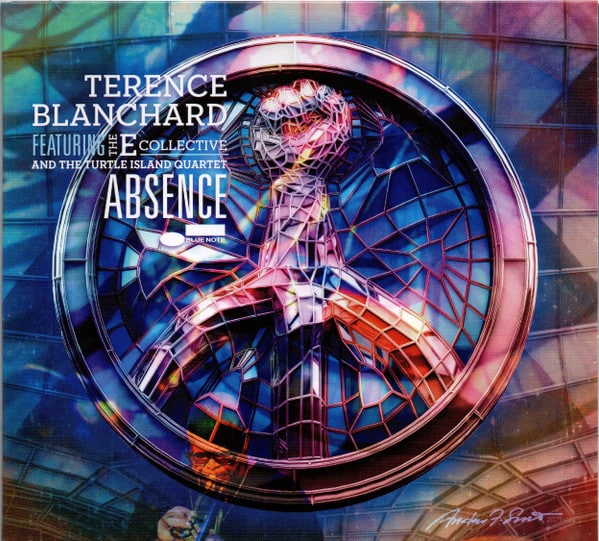
Galloway: On the new album, one of the songs you wrote is titled “I Dare You.” Isn’t that a direct quote from something Wayne said about jazz?
Blanchard: Right. He said, “Jazz means: I Dare You!”
Galloway: How did you approach that idea musically?
Blanchard: By allowing my heart to speak and not try to coax it into any specific direction.
Galloway: I remember “The Elders” as the last piece on Side 1 of Weather Report’s Mr. Gone album and being vey ethereal. What did you hear in it?
Blanchard: My pianist Fabian Almazan wanted to do that one and “When It Was Now,” things from later in Wayne’s career. We love playing them live because they always go somewhere different every night.
That was the beautiful thing about making this record. Before the session, we went to Wayne’s house and hung out with him. Now, I’d been there before. But some of the guys in the band as well as members of the Turtle Island String Quartet hadn’t. One of those things about Wayne is that once you meet Wayne, you understand why his music sounds the way that it does. It’s like meeting (Thelonious) Monk. Sometimes, you can begin to feel totally inadequate in your understanding of a great. “Why can’t I write like that?” But once you meet them, you’re like, “Oh, that’s why.” What that’s really supposed to make you feel is, “What is that criteria for me that allows me to be different?”
So, in doing this record, it wasn’t just about doing his tunes. With Wayne, he wants to know what you have to say. You have to make a statement.
Galloway: Do you remember the first time you heard Wayne’s music?
Blanchard: I can’t remember the first tune of Wayne’s I ever heard. But I remember playing one with Art Blakey which was “Witch Hunt.” That tune blew me away from a compositional standpoint. Then I got a chance to meet Wayne when I was with Art in an airport in Spain. Art looks up and says, “Ay Wayne” (with a perfect scratchy voice imitation). Wayne turned around and came over. We were in shock like, “Oh, shit! What do we do!?” But he was cool. He talked to Art for a lil’ bit then went on about his business. But then I started working with him at The Thelonious Monk Institute of Jazz (now the Herbie Hancock Institute of Jazz) and really started to get to know him. Every time I was around him, I would just get so inspired. The way he thinks about the world just puts something on your mind. Wayne Shorter is probably the purest soul I’ve ever encountered on this planet.
Galloway: What traits show up in his music that you experience when you meet the man?
Blanchard: The true essences of honesty and purity… He’s somethin’ else. You oughta hear Herbie talk about him. Getting back to my band members meeting him, when we left, they were all in a daze…
And I’ll share with you one of my experiences with Wayne. One of my daughters and I went over to have lunch or something. He was down in his music room. He’s got score paper in front of him. And he’s writing his opera from memory…in pen. I’m sitting there looking at that like, “O.K.!”
Galloway: Wow…straight from head to paper, emphatically put down in pen.
Blanchard: Bruh!
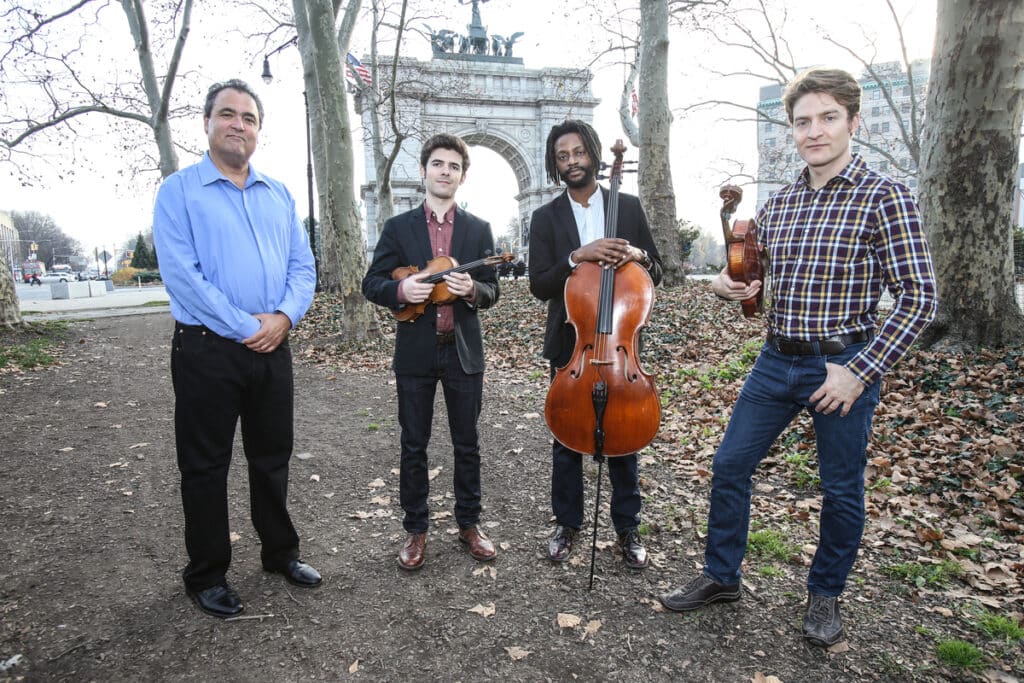
Galloway: So, what can we expect during Tuesday evening’s performance?
Blanchard: First of all, I’m blessed to have a very talented band. Forward-thinking musicians all. On top of it, to have The Turtle Island String Quartet. They are totally redefining what a string quartet is. I keep saying I’m going to do a before and after photograph of the audience when I introduce them. The audience always gives me one look beforehand like, “Aw, here we go.” After they hear them, I’m like, “Uh-huh…I tried to tell ya!” People freak out over them.
We Publish News 24/7. Don’t Miss A Story. Click HERE to SUBSCRIBE to Our Newsletter Now!



